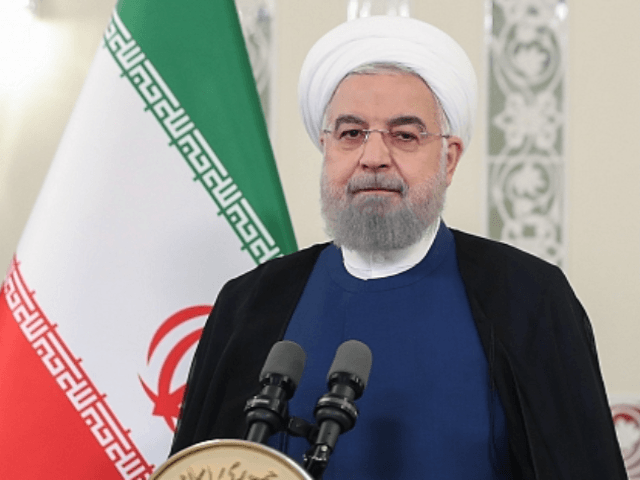Iranian President Hassan Rouhani delivered a bizarre address to the 2020 U.N. General Assembly in which he claimed Iran single-handedly defeated the Islamic State, portrayed his brutal regime as a paragon of tolerance and human rights, and compared the Iranian people suffering under U.S. sanctions to George Floyd suffering beneath the knee of a policeman.
Rouhani spoke of the coronavirus as a “common pain for humanity, thanks to the rapid growth of science, technology, and the media,” demonstrating that “despite all progress, our ignorance as humans far outweighs our knowledge.”
“COVID-19 [Chinese coronavirus] is calling us to more humility, and more humbleness before the Almighty and the truth of creation,” he said. “It is guiding human societies towards civil piety in promoting social and individual ethics, as well as preventing environmental degradation, and manipulation of nature, and unhindered interference in creation.”
Rouhani said “the resilient people of Iran” have suffered more than many others during the pandemic due to the “harshest sanctions in history, imposed in blatant and gross violation of the charter of the United Nations, international agreements, and Security Council resolution 2231.”
The Iranian president exploited civil unrest to attack the moral legitimacy of the United States, naturally ignoring Iran’s overstuffed dungeons and its penchant for murdering protesters.
“The footage broadcast to the world concerning the treatment of an African-American by the U.S. police is reminiscent of our own experience,” Rouhani said.
He was referring to repression under the Shah in the 1970s, not the horrors routinely perpetrated against dissidents by the regime he represents.
“We instantly recognize the feet kneeling on the neck as the feet of arrogance on the neck of independent nations,” he said. “For decades, the valiant Iranian nation has paid a similar high price for its quest for freedom and liberation from domination and despotism. However, the Iranian nation has not only resisted the pressure, but flourished and advanced, while persistently pursuing its historical and civilizational role as the axis of peace and stability, the harbinger of dialogue and tolerance, and the champion of the fight against occupation and extremism.”
“We stood with the people of Afghanistan against Soviet occupiers, domestic warlords, extremists, al-Qaeda terrorists, and American occupiers,” Rouhani boasted. Later he took credit for rescuing Kuwait and foiling Saddam Hussein’s “dream of dominating all his former Arab allies,” and for rescuing the Yazidis from ISIS.
“We stood with the people of Iraq against Saddam’s tyranny, U.S. occupation, and Daesh savagery,” he said, using another name for the Islamic State. He similarly claimed to have helped protect the people of Syria from terrorists, “separatists,” and foreign fighters, and to have shielded the people of Lebanon from “Zionist occupiers, domestic warmongers, and foreign plotters.”
Rouhani also weighed in on the Palestinian situation, claiming Iran has protected them from “genocide, forced displacement, and racism” while castigating the growing list of nations making peace with Israel for supposedly abandoning the Palestinians to a terrible fate. He rhapsodized about the “besieged people of Yemen” without mentioning that the insurgents supported – and armed – by Iran overthrew the legitimately elected government years ago.
All of that was standard Iranian boilerplate, but it was surprisingly bold for Rouhani to claim Iran single-handedly stood against ISIS and helped show “the true face” of “moderate and rational Islam” to the international community.
Rouhani celebrated Iran’s chief terrorist commander, Maj. Gen. Qasem Soleimani, killed by a U.S. airstrike on Iraqi soil while organizing terrorist attacks on military bases and an assault on the U.S. Embassy in Baghdad, as a heroic “martyr” and “champion of the fight against violent extremism in the Middle East.” In Rouhani’s telling, Soleimani spent his days fighting to protect Muslims, Christians, and others against “medieval reactionaries.”
Rouhani lamented the U.S. withdrawal from the Joint Comprehensive Plan of Action (JCPOA), better known as the Iran nuclear deal, which he hailed as “one of the biggest accomplishments in the history of diplomacy.” He falsely claimed Iran has remained “faithful” to the deal “in spite of persistent violations by the United States.”
Rouhani told the United Nations that given his extremely creative interpretation of recent history, Iran does not deserve to suffer under sanctions.
“The response to peace is not war. The reward for combating extremism is not assassination,” he said.
Rouhani complained that, unlike the street violence he saluted in the United States, protests against his own regime, and against its proxies like the terrorist Hezbollah group in Lebanon, are all the work of “outside agitators” attempting to destabilize governments by sponsoring “street riots.” He accused the United States of sponsoring and equipping every malevolent force in the Middle East, from Saddam Hussein to the Islamic State, and claimed the U.S. accused Iran “without foundation” of seeking nuclear weapons.
Rouhani thanked the U.N. Security Council, and especially Russia and China, for resisting “the unlawful U.S. attempt” to invoke snapback sanctions against Iran, calling it a “victory not just for Iran, but for the global community during the transitional international order in the post-Western world” that appropriately humiliated “aspirant of hegemony” America.
“Any U.S. administration after the upcoming elections will have no choice but to surrender to the resilience of the Iranian nation,” he concluded after complaining at length about the sanctions imposed on Iran.

COMMENTS
Please let us know if you're having issues with commenting.